Posted by Elena del Valle on October 31, 2011

Joaquin Nuño-Whelan, vehicle chief engineer for small cars, Chevrolet
Photo: General Motors
A podcast interview with Joaquin Nuño-Whelan, vehicle chief engineer for small cars, Chevrolet is available in the Podcast Section of Hispanic Marketing & Public Relations, HispanicMPR.com. During the podcast, he discusses his job and the Sonic with Elena del Valle, host of the HispanicMPR.com podcast.
Joaquin serves as the vehicle line director for the 2012 Chevrolet Sonic, described as the only sub-compact car made in America. He and his team strive to create a faster, safer and more connected vehicle compared to others of its size with an improved powertrain and increased horsepower for consumers who crave power behind their small fuel efficient rides.
In 1997, Joaquin joined GM and later embarked upon a two-year assignment in Mexico City. During that time, Joaquin led a chassis engineering team in Toluca and developed the alternative energy strategy for GM de Mexico as a special vehicle program manager. While there, he also launched the country’s first Robotics team, which later won the Rookie All-Star achievement, the highest recognition for a first-year team. Upon returning to the States, Joaquin founded Green Place Detroit, a non profit dedicated to providing middle school and high school students the opportunity to make a lasting impact on their community through its urban garden and eco-house projects in Southwest Detroit.
A 2000 graduate of University of Detroit Mercy, Joaquin majored in mechanical engineering. He lives in Royal Oak, Michigan with his wife, Tanya, and their two kids, Isabella and Lander.
To listen to the interview, scroll down until you see “Podcast” on the right hand side, then select “HMPR Joaquin Nuño-Whelan” click on the play button below or download the MP3 file to your iPod or MP3 player to listen on the go, in your car or at home. To download it, click on the arrow of the recording you wish to copy and save it to disk. The podcast will remain listed in the October 2011 section of the podcast archive.
Posted by Elena del Valle on October 28, 2011

Singer Ricky Martin
Photos: Fontainebleau Miami Beach
Thanksgiving weekend, singer Ricky Martin will rock for a select crowd staying at the Fontainebleau Miami Beach in South Florida as part of the famous hotel’s newly launched BleauLive performance series. According to promotional materials, Martin’s Fontainebleau performance will be his last before he heads to New York City to star as Che in the Broadway revival of Andrew Lloyd Webber’s Evita.
Only guests of the hotel that weekend will be able to attend the performance. Radio stations Y100 and Mega 94.9 will be the hotel’s exclusive partners for the show and accommodations package provided by BleauLive, the resort’s new entertainment unit that offers inclusive performances and accommodations at the Fontainebleau.
The hotel promises, in addition to the performance and depending on the package purchased, personal guest interaction with the artist and a weekend getaway at the Fontainebleau hotel. BleauLive launched this past Labor Day weekend with a performance and meet and greet with Pitbull, a hip hop artist.

Singer Ricky Martin
“Since opening in 1954, Fontainebleau Miami Beach has been a go-to destination for iconic performers of their generation to appear. From Elvis and Sinatra in the early days to more recent appearances from Lady Gaga and Katy Perry, legendary musicians have always wanted to perform at our resort,” said Jeffrey Soffer, executive chairman, Fontainebleau Miami Beach. “Our new BleauLive performance series is an organic extension of this rich history and we are thrilled to announce Ricky Martin as the next artist to appear for his final performance before his return to Broadway.”
Packages are priced between $329 and $799 at the Miami Beach hotel. The Fontainebleau, a well known Miami Beach property for more 50 years, sits on 22 oceanfront acres. It houses 1,504 rooms, 12 restaurants and lounges, two nightlife venues, and a 40,000-square-foot spa.
Posted by Elena del Valle on October 26, 2011
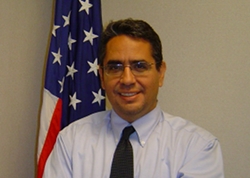
P. David Lopez, general counsel, EEOC
Photos: U.S. Equal Employment Opportunity Commission
Bass Pro Outdoor World, LLC (Bass Pro), a retailer of sporting goods and apparel, in the United States and Canada, allegedly engaged in a pattern or practice of failing to hire African-American and Hispanic applicants for positions in its retail stores nationwide, and retaliated against employees who opposed the discriminatory practices, according to a lawsuit files recently by the U.S. Equal Employment Opportunity Commission (EEOC). The retailer retaliated against employees who opposed discrimination, and destroyed records, the agency said in a press release.
According to the EEOC’s suit filed in U.S. District Court for the Southern District of Texas, Houston Division (Civil Action No. 4:11-CV-3425), Bass Pro has been discriminating in its hiring since at least November 2005. The EEOC’s suit alleges that qualified African-Americans and Hispanics were routinely denied retail positions such as cashier, sales associate, team leader, supervisor, manager and other positions at many Bass Pro stores nationwide.
The lawsuit alleges that managers at Bass Pro stores in the Houston area, in Louisiana, and elsewhere made overtly racially derogatory remarks acknowledging the discriminatory practices, including that hiring black candidates did not fit the corporate profile.
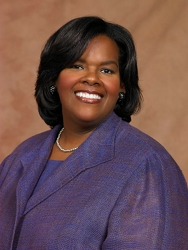
Jacqueline A. Berrien, chair, EEOC
“Excluding qualified individuals from employment because of their race or ethnicity or in retaliation for exercising protected rights are fundamental violations of the laws we enforce,” said Jacqueline A. Berrien, chair, EEOC. “The EEOC will diligently protect the rights of job applicants to ensure that hiring decisions are based on abilities, not on race or ethnicity.”
The lawsuit also claims that Bass Pro unlawfully destroyed or failed to keep records and documents related to employment applications and internal discrimination complaints. Agency representatives believe also, that Bass Pro punished employees who opposed the company’s unlawful practices, in some instances firing them or forcing them to resign.
This alleged behavior violates Title VII of the Civil Rights Act of 1964, which prohibits discrimination based on race and national origin, and prohibits employers from retaliating against employees who complain about employment discrimination and requires them to keep certain employment records. In 2010, the EEOC was aware of 1,822 cases of discrimination based on country of origin, color or race and 511 cases of retaliation.
“As a law enforcement agency, the EEOC is uniquely positioned to challenge systemic hiring discrimination,” said P. David Lopez, general counsel, EEOC. “It is unlawful for employers to deny jobs to applicants based on their race or national origin and the EEOC will vigorously pursue such cases and require companies to reform their hiring practices and make victims of the discrimination whole.”
The EEOC’s administrative investigation culminated in findings of class-wide hiring discrimination based on statistical and anecdotal evidence, and retaliation. The EEOC attempted to reach a voluntary settlement with Bass Pro before filing suit. The lawsuit seeks a permanent injunction prohibiting Bass Pro from engaging in race discrimination, national origin discrimination, retaliation, and improper record destruction. It also seeks back pay on behalf of victims of hiring discrimination and/or retaliation, compensatory and punitive damages and other relief, including implementing fair recruitment and hiring procedures, and reinstatement or rightful-place hiring of mistreated job applicants and former employees.
“We will hold employers accountable for depriving qualified minority workers of good jobs simply because of their race or national origin,” said Jim Sacher, Houston regional attorney, EEOC. “Such behavior is always out of season.”
The agency is seeking the assistance of individuals who believe they may have been denied a position at Bass Pro because of their race (African-American or black) or ethnicity (Hispanic or Latino) or who have any information that would be helpful to the EEOC’s suit against Bass Pro through the EEOC toll free number at (855) 857-8747 or by e-mail at Basspro.lawsuit@eeoc.gov.
Posted by Elena del Valle on October 25, 2011
Information provided by Event Partner
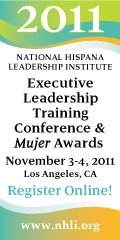
NHLI 2011 Executive Leadership Training Conference and Mujer Awards
Los Angeles, CA on November 3-4, 2011
The Executive Leadership Training Conference and Mujer Awards brings together Latinas, national leaders and NHLI’s accomplished alumnae
Los Angeles, CA.– The National Hispana Leadership Institute (NHLI) will convene over six hundred Latinas, national leaders and NHLI’s accomplished alumnae at the Wilshire Grand Hotel in Los Angeles, CA on November 3-4, 2011.
This year’s Executive Leadership Training Conference and Mujer Awards theme, Latinas Connecting Across Generations, Reaching New Heights, will offer two days of cutting-edge leadership and professional development, networking, educational and inspirational keynotes and workshops facilitated by top-level Latinas from across the country.
“We’re preparing an exciting, yet highly educational conference for beginning and established professionals,” said Barbara J. DesMarteau, Acting President of the National Hispana Leadership Institute. “This year’s conference celebrates Latinas fostering professional relationships across generations as they strengthen each other and reach a greater more unified potential.”
“From a health and wellness expo and career recruitment fair, to empowering workshops, inspiring panel sessions, exhilarating fitness classes and engaging art exhibits,” added DesMarteau. “This an event that you cannot afford to miss.”
The Mujer Awards Gala, celebrated since 1993, will be held on Friday, November 4. NHLI will close the conference by paying tribute to the achievements and contributions of exceptional Latina leaders. This year’s honorees include Maria Contreras-Sweet, The Honorable Gloria Molina, The Honorable Lucille Roybal-Allard, Lilian Roybal Rose and María Rita Jaramillo.
Founded in 1987, NHLI has trained and empowered more than 10,000 Latina leaders from the public and private sectors who have been appointed to leadership positions in government, corporate America, nonprofits, foundations or have started their own businesses. NHLI’s mission is to develop Hispanas as ethical leaders through training, professional development, relationship building, and community activism. www.nhli.org.
Posted by Elena del Valle on October 24, 2011

Colleen Fahey, chief strategy officer, VerveLife
Photo: VerveLife
A podcast interview with Colleen Fahey, chief strategy officer, VerveLife is available in the Podcast Section of Hispanic Marketing & Public Relations, HispanicMPR.com. During the podcast, she discusses RhymbaLatino promotional music store with Elena del Valle, host of the HispanicMPR.com podcast.
Colleen’s areas of expertise are promotional marketing, promotions for children’s products, retail communications, children and food, culture shock and reverse culture shock and digital music marketing. Her background in developing and driving promotional and retail communications strategies includes leading the McDonald’s Happy Meal from a promotion to a full-time menu item.
Prior to her current position Colleen held a dual role as director of Strategic Planning for Publicis Dialog in Seattle and network director through-the-line expert for Nestle’s Global Team as part of Publicis Groupe in Paris. As executive vice president and executive creative director of Frankel, she worked with Frito Lay, McDonald’s, Nestle, Purina Latin America, Target Stores, United Airlines, United States Postal Service, and Visa.
To listen to the interview, scroll down until you see “Podcast” on the right hand side, then select “HMPR Colleen Fahey” click on the play button below or download the MP3 file to your iPod or MP3 player to listen on the go, in your car or at home. To download it, click on the arrow of the recording you wish to copy and save it to disk. The podcast will remain listed in the October 2011 section of the podcast archive.
Posted by Elena del Valle on October 21, 2011

The Universal Code of Formerly Unwritten Rules book cover
Photo: Adams Media
Politeness is the glue that binds us. Holding a door open for someone or introducing a colleague to another at an event are common courtesies we may not event stop to think about. Some of these rules may be informal and vary depending on the setting, part of the country (or world), culture and so forth. Sometimes it’s challenging to avoid getting in the proverbial foot-in-of mouth situation which could prove tricky or embarrassing at work or when with colleagues from work.
Quentin Parker, a journalist and teacher, has a possible answer to those times, his own code of conduct. It includes simple concepts that may appear obvious such as “Never hog both armrests when you fly; and doorways, staircases, and elevator entrances are inappropriate spots to stop and chitchat.”
His rules, somewhat tongue in cheek, were recently made available to others in the form of a book, The Universal Code of Formerly Unwritten Rules: From Airline-Armrest Etiquette to Flushing Twice, 251 Uncompromising Laws of Common Civility That We Wish Everyone Knew (Adams Media, $13.95), published this year.
The 234-page softcover book is divided into seven chapters. Chapter 2, from pages 33 to 60, is dedicated to Unwritten Rules in the Workplace. Some rules in other chapters may also apply to work situations. Many rules in Chapter 6 about spoken and written communication may appeal to those in the work place. For example, Unwritten Rule #185 One should never write an entire e-mail in all capital letters.

Click to buy The Universal Code of (Formerly) Unwritten Rules
Comments:
Filed Under: Books
Posted by Elena del Valle on October 19, 2011
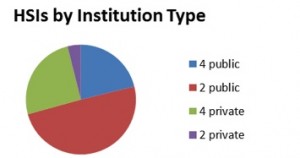
Photo, graphic: Hispanic Association of Colleges and Universities (HACU)
Degree-granting academic institutions with Full-Time Equivalent undergraduate enrollments of 25 percent or more of Hispanic are defined as Hispanic Serving Institutions (HSIs) by the Higher Education Act. In 2010, there were 311 such institutions with an enrollment of 1,348,513 Hispanic students in post secondary non-profit schools, according to the Hispanic Association of Colleges and Universities (HACU), a 400-member organization founded in 1986 by 18 original colleges and universities to be “the champion of Hispanic higher education.”
HIS institutions receive 66 cents for every dollar allocated to other institutions of higher learning every year per student from federal funding sources. Although these institutions enrolled 16 percent of all students in post secondary non profit schools, and served 54 percent of all Hispanic students they represented 9 percent of non profit colleges and universities in the country.

John Moder, Ph.D., senior vice president and chief operating officer, Hispanic Association of Colleges and Universities
“Hispanic-Serving Institutions (HSIs) are playing the key role in Hispanic higher education, since these 300 institutions enroll more than half the Latinos in US colleges and universities. As the Hispanic college population has grown, so has the number of HSIs. Addressing the achievement gap or reaching the President’s goal of becoming number one in the world in degree attainment will require more attention to (and more funding for) these institutions that are already educating most the nation’s largest and fastest-growing minority population,” said John Moder, Ph.D., senior vice president and chief operating officer, Hispanic Association of Colleges and Universities, by email in response to a question about the importance of these institutions and the significance of their growth in the past decade.
Of the 311 HSIs in 2010, 152 (49 percent) were public two-year institutions, 65 public four-year institutions, 82 private four-year institutions, and 12 private two year institutions.
California, with 98 HSIs had the most such institutions of any state followed by 56 each in Puerto Rico and Texas, 23 in New Mexico, 15 each in Florida and New York, 13 in Illinois, 10 in Arizona, 6 in New Jersey, 5 in Colorado, 4 in Kansas, 3 each Massachusetts and Washington, 2 in Connecticut, and 1 each in Indiana and Oregon.
Posted by Elena del Valle on October 17, 2011
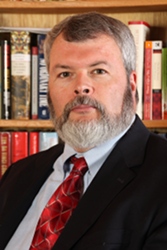
William S. Hettinger, Ph.D., president, Prosperous Communities
Photo: Prosperous Communities
A podcast interview with William S. Hettinger, Ph.D., president, Prosperous Communities, is available in the Podcast Section of Hispanic Marketing & Public Relations, HispanicMPR.com. During the podcast, he discusses the key to lifetime employment with Elena del Valle, host of the HispanicMPR.com podcast.
Bill is an international consultant and educator dedicated to training students, business owners, and managers in finance, entrepreneurship and small-business creation. The company he leads seeks to create economic vitality and help individuals and organizations turn ideas into actions.
He is also a principal at the Institute for Finance and Entrepreneurship, where he writes, trains, and mentors small business owners and aspiring entrepreneurs. Prior to establishing his consultancy, Bill worked in real estate and finance for several large institutional investors and for a Big-6 consulting firm. He is the coauthor of Finance Without Fear: A Guide to Creating and Managing a Profitable Business (see Consultants outline business finance basics).
To listen to the interview, scroll down until you see “Podcast” on the right hand side, then select “HMPR William S. Hettinger, Ph.D.” click on the play button below or download the MP3 file to your iPod or MP3 player to listen on the go, in your car or at home. To download it, click on the arrow of the recording you wish to copy and save it to disk. The podcast will remain listed in the October 2011 section of the podcast archive.
Posted by Elena del Valle on October 14, 2011

Listening to Latina/o Youth book cover
Photos: Peter Lang
Kristin Moran, associate professor in the Department of Communication Studies at the University of San Diego, was curious to know how Latinos consume media and their perceptions of Spanish language television as well as of the portrayal of Latinos in mainstream media. Toward that goal she conducted detailed interviews with 17 families in 2008 and again in 2010.
In Listening to Latina/o Youth Television Consumption Within Families (Peter Lang Publishing, $33.95) she shares her findings and conclusions. She begins with a demographic profile of the market segment she examined followed by an analysis of media targeting Latinos including Spanish language, bilingual and Hispanic oriented outlets.

Kirstin C. Moran, author, Listening to Latina/o Youth
She dedicates the following chapters to her interview findings with an emphasis on the media consumption habits of youth and Mexican American families, addressing news and telenovela (Spanish language serialized programs similar to soap operas) preferences. She then addresses how the Latinos she met with see Latino portrayals in the media and their desire for balanced representation that integrates them into the mainstream rather isolating them.
In closing, she suggests that Latinos who speak Spanish do not necessarily watch more Spanish language programming. Instead second generation and younger Latinos seek English language programming that reflects their diversity.
The 215-page book is divided into six chapters: Latina/os in the Audience, Latina/o Youth Market, Latina/o Media Consumption, Connecting to “Home,” Concerning Representation Latina/os in English- Language Media, and (Re)Imagining a Latina/o Audience. It also has an Introduction and one appendix with family profiles.

Click to buy Listening to Latina/o Youth
Comments:
Filed Under: Books
Posted by Elena del Valle on October 12, 2011

In 2010, 1 million Hispanics had an advanced degree
Photo: U.S. Census Bureau, Public Information Office (PIO)
The latest United States Census has broadened our knowledge of the national population including size and demographic trends, and provided a picture of the largest ethnic group’s growth. According to the Census, last year there were 50.5 million Hispanics in the country; they represented just over 16 percent of the population.
While the Hispanic market grew 43 percent in the last decade (2000 to 2010) the fastest growth for Hispanics was in the South and Midwest. More than three quarters of Latinos live in eight states: California, Texas, Florida, New York, Arizona, Illinois, New Jersey and Colorado.
The Hispanic population is younger than the mainstream. The median age among Hispanics is 27.4 for Hispanics.
When it comes to education there is room for improvement: 64 percent of Hispanic high school graduates ages 16-24 were enrolled in college in 2008, compared to 72 percent for non-Hispanic whites. In higher education the difference was greater: 13.9 percent of Latinos had a bachelor’s degree compared to 30.3 percent for the mainstream, and 4 percent had an advanced degree compared to 10.7 percent for non Hispanic whites.
In 2010, 2.4 million Hispanics including those in Puerto Rico were enrolled in college. Almost half (49 percent) of Hispanic college students attended a two-year institution compared to 37 percent of all college students.
Seen another way, in 2010, 63 percent of Hispanics 25 and older had a high school education or higher; there were 3.9 million Hispanics 18 and older with a bachelor’s degree or higher; 1 million Hispanics 18 and older had an advanced degree (see Educational Attainment in the United States: 2010 Detailed Tables)
.
In 2009, 12 percent of college students, undergraduate and graduate students, were Hispanic; and 20 percent of elementary and high school students were Hispanic (see School Enrollment – Social and Economic Characteristics of Students: October 2009).


























